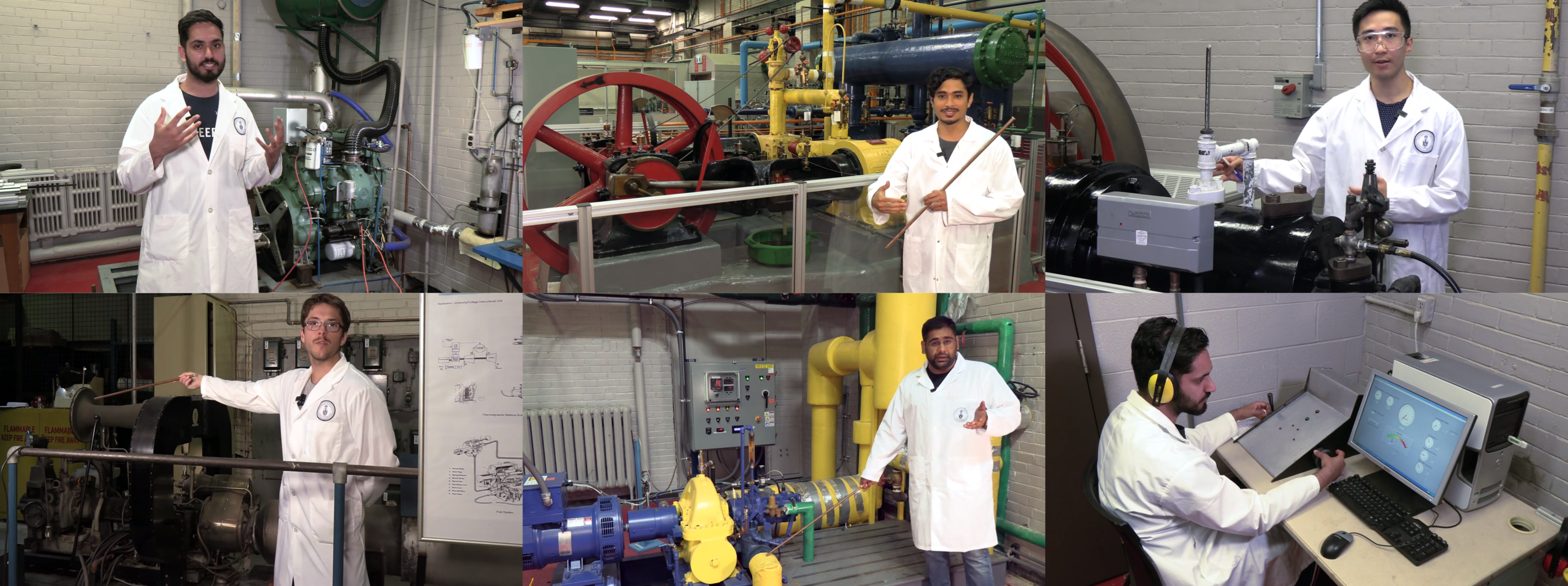
The heat engines lab in MC120 is a unique space in the Mechanical Engineering building. Jason Chan and Raymond Guan, lead teaching assistants for the Fall 2020 MIE303 and Winter 2021 MIE311 course on thermal energy conversion taught by Professor Aimy Bazylak, remember being impressed to see the engines, air compressors, and turbines they learned about through textbooks in their undergrad in person when they started their graduate studies at MIE.
“It’s so valuable for students to see these machines in person, you can really see the mechanics up close and it helps them to understand the ins and outs of how they work,” Chan said. “When we realized MIE 303 and MIE311 would be taught online for Fall 2020 and Winter 2021 we wanted to make sure the next group of students wouldn’t miss out on that experience.”
In the summer of 2020 the teaching team began working on a plan to bring the in-person experience to the virtual classroom. In previous terms, the labs take place over five weeks with each session lasting three hours. The teaching assistant would demonstrate all of the working principles behind each of the machines and show how the heat engines are used in industry. To recreate this experience, the teaching team created a series of in-depth video recordings for each of the machines.
“The preparation for this term was really challenging and different from what we normally do as TAs. We had to prepare scripts in advance of each recording and the TA would need to move through the demos as though they were in a classroom full of students,” Chan, who led the filming side of things, explained.
“There was also the added pressure of working with tight deadlines, arranging the time we could be in the lab and of course following all of the safety precautions for working on campus. The lab technicians, Tomas Bernreiter, Tony Ruberto, and Osmond Sargeant, were essential collaborators. They made sure all the filming equipment was set up and helped to guide the TAs through the demos,” Guan, who led the video editing process, added.
The virtual labs in their final form are very similar to the in-person experience. The TAs lead the class through a slide presentation and have students watch the accompanying video recording. The videos have been broken down into segments that reflect how they would see the demonstration in-person. This allows for plenty of time for students to ask questions as they move through the demo, much as they would in person.
“I received feedback in our tutorial chat that this was the best virtual lab a student had experienced so far, it’s a great feeling to know we brought some normalcy to our students and they didn’t have to miss out on the in-person experience,” said Chan.
The successful transition to online was only possible through the great collaboration between the teaching team and the Undergraduate Laboratory Support team. The teaching team for MIE303 and MIE311 included Jason Chan, Raymond Guan, Hisan Shafaque, Taylr Cawte, Vikram Soni, Pranay Shrestha, and Eric Chadwick. The Undergraduate Laboratory Support Team consists of Tomas Bernreiter (Laboratory Engineer & Manager), Tony Ruberto (Senior Student Lab Machinist), and Osmond Sargeant (Laboratory Technologist).
-Published March 12, 2021 by Lynsey Mellon, lynsey@mie.utoronto.ca